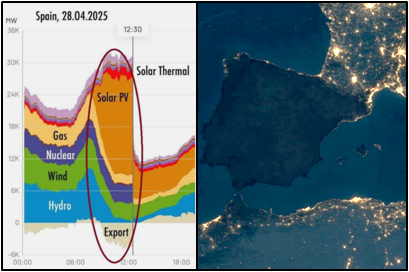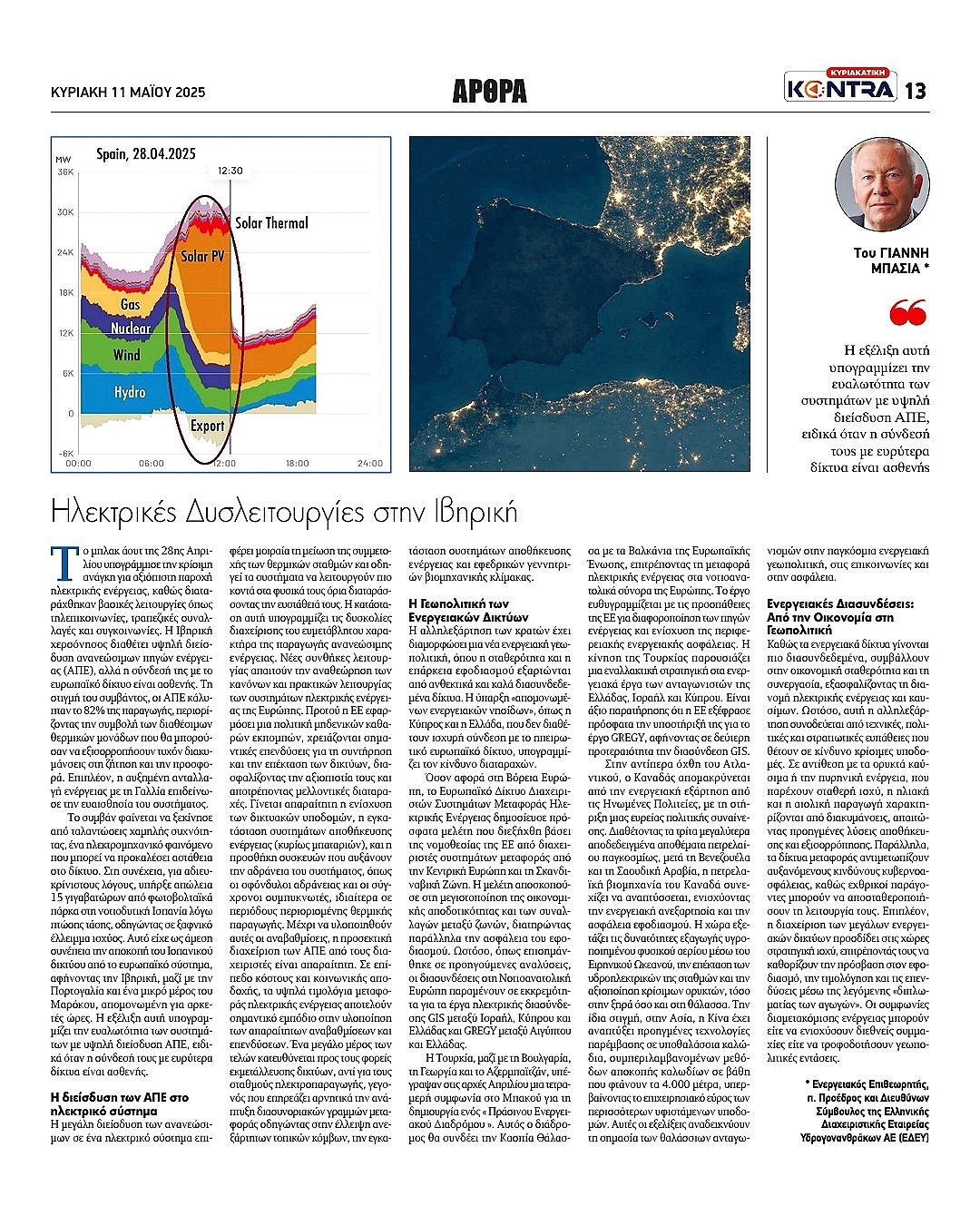Electrical Malfunctions in Iberia

The event appears to have been initiated by low frequency oscillations, an electromechanical phenomenon that can cause instability in the grid. Then, there was a loss of 15 gigawatt hours from photovoltaic parks in southwestern Spain due to a voltage drop, leading to a sudden power shortage. This had as a direct consequence the disconnection of the Spanish network from the European system, leaving Iberia, along with Portugal and a small part of Morocco, isolated for several hours. This development highlights the vulnerability of systems with high RES penetration, especially when their connection to wider networks is weak.
The penetration of renewables into the electricity system
The large penetration of renewables in an electrical system inevitably leads to a reduction in the participation of thermal power plants and by fact leads the systems to operate closer to their natural limits, disrupting their stability. This situation underlines the difficulties of managing the volatile nature of renewable energy production. New operating conditions require a revision of the rules and operating practices of Europe's electricity systems. Before the EU implements its famous “net-zero emissions policy”, significant investments are needed to maintain and expand networks, ensuring their reliability and preventing future disruptions.
The Geopolitics of Energy Networks
The interdependence of states has shaped a new energy geopolitics, where stability and adequacy of supply depend on resilient and well-interconnected networks. The existence of "isolated energy islands", such as Cyprus and Greece, which do not have a strong connection to the continental European grid, underlines the risk of disruptions. As regards Northern Europe, the European Network of Electricity Transmission System Operators recently published a study carried out under EU legislation by transmission system operators from Central Europe and the Nordic Zone. The study aimed to maximize economic efficiency and cross-zone trade while maintaining security of supply. However, as pointed out in previous analyses, interconnections in Southeast Europe remain pending for the GSI electrical interconnection projects between Israel, Cyprus and Greece and GREGY between Egypt and Greece.
Turkey, together with Bulgaria, Georgia and Azerbaijan, signed a quadrilateral agreement in Baku at the beginning of April on the creation of a 'Green Energy Corridor'. This corridor will connect the Caspian Sea with the Balkans of the European Union, allowing electricity to be transported to Europe's southeastern border. The project is aligned with the EU's efforts to diversify energy sources and strengthen regional energy security. Turkey's move presents an alternative strategy to the energy projects of Greece's competitors, Israel and Cyprus. It is noteworthy that the EU has recently expressed its support for the GREGY project, leaving GSI interconnection as a second priority.
On the other side of the Atlantic, Canada is moving away from energy dependence on the United States, supported by a broad political consensus. Possessing the world's third-largest proven oil reserves, after Venezuela and Saudi Arabia, Canada's oil industry continues to grow, enhancing energy independence and security of supply. The country is looking at the potential of exporting liquefied natural gas through the Pacific Ocean, expanding its hydroelectric power plants and exploiting critical minerals, both on land and at sea. At the same time, in Asia, China has developed advanced technologies for interfering with subsea cables, including methods of cutting cables to depths of up to 4,000 meters, exceeding the operational scope of most existing infrastructure. These developments highlight the importance of maritime competitions in global energy geopolitics, communications and security.
Energy Interconnections: From Economics to Geopolitics
As energy grids become more interconnected, they contribute to economic stability and cooperation by ensuring the distribution of electricity and fuel. However, this interdependence is accompanied by technical, political, and military vulnerabilities that compromise critical infrastructure. Unlike fossil fuels or nuclear power, which provide stable power, solar and wind generation are characterized by fluctuations, requiring advanced storage and balancing solutions. At the same time, transmission networks face increasing cybersecurity risks, as hostile actors can destabilize their operation. In addition, the management of large energy networks gives countries strategic power, allowing them to determine access to supply, pricing and investment through so-called "pipeline diplomacy".
Energy transit agreements can either strengthen international alliances or fuel geopolitical tensions.
Γιάννης Μπασιάς: Ηλεκτρικές Δυσλειτουργίες στην Ιβηρική - KontraNews
"Κυριακάτικη Κόντρα - Έντυπη Εκδοση - Απόψεις - May 11, 2025"
Yannis Bassias – Selected parts translated in English from the original article in Greek
